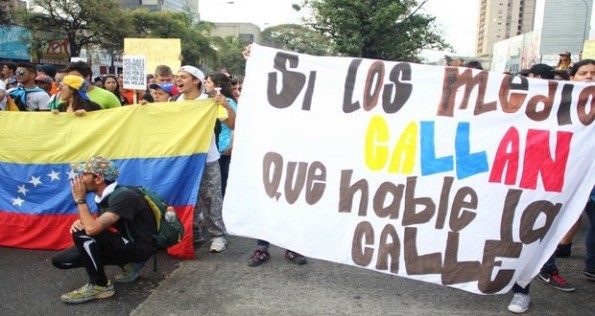In one way or another, Cuba is taking note of the street protests occurring these days in Venezuela. The most nervous are the olive-green autocrats.
According to a low-level party official, since the death of Hugo Chávez on 5 March 2013, the regime has had various contingency plans filed away in case the situation in Venezuela did not turn out to be favourable to the interests of the island.
The official states, “If Maduro falls, we have a plan B. In the different groups, at least at the level where I work, it was taken for granted that Maduro would be a short-lived president. Although the PSUV (United Socialist Party of Venezuela) controls most of the strings of power, there are divergent opinions among Chávez’s own followers about Venezuela’s relationship with Cuba. This type of socialism, with a democratic streak, is not to be trusted. Maduro can lose power both due to a plebiscite repeal or in six years. In our group meetings, it has been said that Maduro’s mandate only serves to gain time”.
The onslaught of opposition marches, barricades, and protests is shaking up different regions of Venezuela, but this force is also reaching the branches of power in Havana.
The Castro brothers still have much at stake in Venezuela. But just in case, Raúl Castro has opened a new window with Brazil in constructing the new port of Mariel and a Special Development Zone with a different jurisdiction.
And they almost begged the United States, enemy number one, to sit down to negotiate. Meanwhile, the Castro regime diplomacy crosses over to Florida, trying to seduce wealthy businessmen of Cuban origin. But the sensible businessmen continue to think about it.
When they look at the recent past, they only see shady management and a mysterious associate who changes the rules of the game at the first opportunity. Therefore, the Caribbean autocracy is going to fight mercilessly and to the teeth in order to keep its strategic position in Venezuela.
The key, as everyone knows, is petroleum. 100 thousand barrels a day acquired at sale prices keep Cubans from suffering 12-hour daily blackouts. When the skydiver from Barinas moved into Miraflores in 1998, Fidel Castro understood that after 9 years travelling through the desert, with finances in the red and exotic sicknesses devastating the country, the hour of his resurrection had arrived.
Cuba entered in a ”light” Special Period. After the fall of the Berlin Wall, the island had experienced a deep-rooted economic crisis, but the faithful Bolivarian shared his chest of treasure. And this was an important part of the anti-imperialist project that so deluded the Commander.
The death of Chávez was the beginning of the end of the honeymoon. Maduro is faithful and he is allowed to lead. But he has no charisma. And after 14 years of economic insanity aimed at winning support among the most disadvantaged, all of the doubts, violence, and inflation have now exploded in the face of the PSUV.
Instead of letting go of the uncomfortable and parasitic burden that is Cuba, governing for all and looking after Lula and Dilma more than the Castros, Maduro, clumsy and stubborn, moved his tokens badly.
He professed to follow the Joropo and Pachanga of comrade Chávez. He designed a simple strategy: he shouldered his friend’s coffin and tries to govern Venezuela in his name.
And he is failing. In Cuba, either because of egoism or short-term mentality, the people on their feet, tired after 55 years of disaster, are crossing their fingers that the Venezuelan crisis does not shut off the petroleum faucet opened by the PDVSA (Petroleum of Venezuela, S.A.).
In a park in the Víbora district in Havana, a 70-year-old retiree expresses his opinion about the situation in Venezuela. “If that guy screws up, the effects on us will be tremendous. The power outages will continue, paralyzing the industries again and we will return to a situation equal to or worse than the beginning of the Special Period in 1990.”
Others are more optimistic. “It’s true, it will be hard. Since the Revolution, we have gotten used to living at the cost of someone else’s sweat. Before it was the USSR, now it’s Venezuela. If the worst happens there, we will have to accelerate the reforms here. Although this is already capitalism, but with low salaries”, states a lady identifying herself as a housewife.
A university student adds to the conversation. “Seeing the marches or strikes on the TV is something I envy. That freedom to protest before governmental institutions, such as in Ukraine or Venezuela… we need it here in Cuba.” And he added that “in FEU (University Student Federation) meetings, the situation in Venezuela is a primary theme, but I have heard rumors that there is more alarm in some Party groups.”
In this hot February, in spite of the news arriving from Caracas, the people on the street continue with their lives. Waiting in long lines to buy potatoes, which were lost in the battle. Going to the markets in search of food, vegetables, and fruit. Or sitting on the corner in the neighborhood to talk about films, fashion, football, or baseball.
And this is because for many on the Island, Venezuela is not in their agenda.
Iván García
Photograph: “If the media stops talking, let the streets talk”, says this banner painted by students marching on 13 February in the Venezuelan city of Valencia, some 172 km (107 mi) west of Caracas. Photo by Luis Turinese, taken from Global Voices Online.
Translated by: M. Ouellette
24 February 2014

